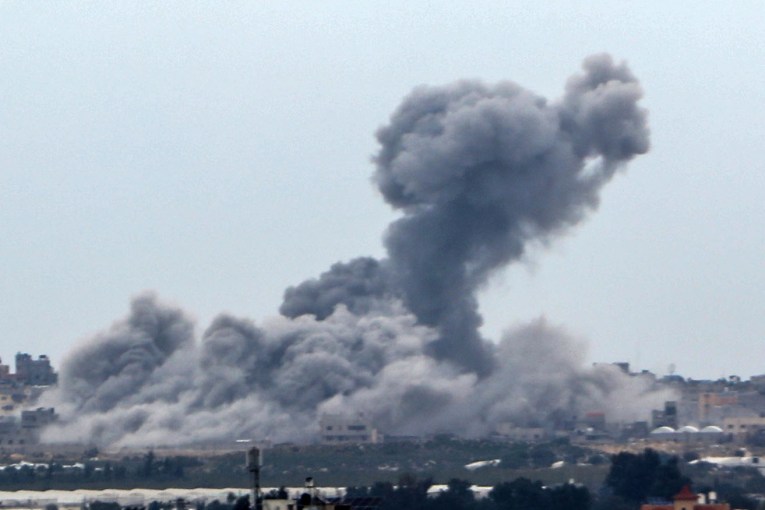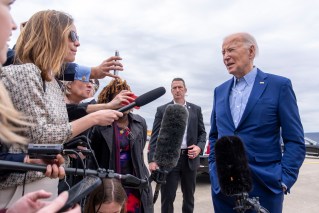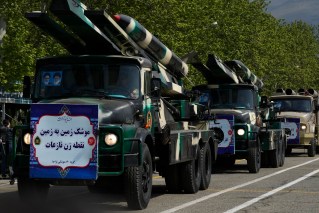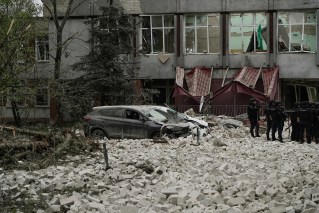Ukraine ‘on brink of disaster’ as West warns Russia
Ukraine has warned it is on the brink of disaster and called up all military reservists after Russia’s threat to invade its neighbour drew sharp rebukes from the United States and its Western allies.
US Secretary of State John Kerry upped the stakes for Russian President Vladimir Putin by bluntly warning that Moscow risked losing its coveted place among the Group of Eight nations over its deployment of troops in Crimea.
The dramatic escalation in what threatens to blow up into the worst crisis between Moscow and the West since the Cold War came as pro-Kremlin forces seized key government buildings in Crimea and were blockading military bases on the strategic Black Sea peninsula.
World leaders huddled for urgent consultations across global capitals after Russia’s parliament voted Saturday to allow Putin to send troops into its western neighbour – a decision US President Barack Obama branded a “violation of Ukrainian sovereignty”.
“Going forward, Russia’s continued violation of international law will lead to greater political and economic isolation,” the White House warned in a statement.
Britain’s Foreign Secretary William Hague said the UK had pulled out of this week’s preparatory meetings for the G8 summit in Sochi in June in protest at Russia’s stance in the Ukraine crisis.
Hague repeated that he was “very concerned” about escalating tensions in Ukraine.
“The sovereignty and territorial integrity of Ukraine has been violated and this cannot be the way to conduct international affairs,” he said.
The former Soviet nation’s new pro-Western Prime Minister Arseniy Yatsenyuk also warned any invasion “would mean war and the end of all relations between the two countries.”
“We are on the brink of a disaster,” Yatsenyuk told the nation of 46 million in a televised address. “This is not a threat. This is a declaration of war on my country.”
Navy chief switches sides

Police officers detain a woman protesting in Moscow against Russia’s actions in the Crimea. Photo: Getty
Ukraine’s navy chief has switched allegiance to the pro-Russian authorities of the flashpoint peninsula of Crimea, a day after he was appointed to the post by interim leader Oleksandr Turchynov.
“I swear to execute the orders of the (pro-Russia) commander-in-chief of the Autonomous Republic of Crimea,” Denis Berezovsky said in a televised statement from inside the Crimean headquarters of the Russian Black Sea Fleet, adding that he “swears allegiance to the residents of the Autonomous Republic of Crimea”.
The seismic declaration came as the Kiev authorities appeared to be losing control of the Russian-speaking Crimea peninsula, which has plunged further and further into disarray since the ouster of Kremlin-backed president Viktor Yanukovych last weekend.
Armed men that Kiev believes are backed by Moscow have since seized key government buildings in the region and surrounded Ukrainian military bases, and Russia’s parliament on Saturday approved the deployment of troops into the country.
It is unclear why and how Berezovsky switched his allegiance, but Crimea’s newly appointed pro-Russia prime minister Sergiy Aksyonov, who is not recognised by Kiev, said the announcement was a “historic event” at a joint press conference with the navy chief.
Australia “deeply concerned”
The federal government has summoned the Russian ambassador to explain his country’s actions in the Ukraine.
Foreign Minister Julie Bishop says the secretary of her department, Peter Varghese, will meet with ambassador Vladimir Morozov later on Monday.
“We’ll express our concerns officially, directly through him and also seek to ascertain exactly what the Russian government thinks it’s doing,” Ms Bishop told ABC radio.
Asked if the government is considering expelling the envoy, Ms Bishop said: “Well, first thing’s first.”
“The way to resolve it is for Russia to withdraw its forces,” she said.
Ms Bishop says Australia is using its temporary seat on the United Nations Security Council to urge a peaceful resolution to the crisis calling the developments “deeply concerning”.
“We’ve made it clear that we unequivocally support the territorial integrity and sovereignty of Ukraine,” she said. “It is unacceptable for Russia or any other nation to threaten it.”
She says Australians in the Ukraine and Crimea should leave if they can.
Moscow tightens grip on Crimea
Pro-Moscow gunmen intensified their grip Sunday on large swathes of the rugged flashpoint peninsula that has housed Russian navies since the 18th century.
Witnesses said Russian soldiers had blocked about 400 Ukrainian marines at a base in the eastern port city of Feodosiya and were calling on them to surrender and give up their arms.
Ukraine’s defence ministry said 1000 armed fighters and 20 trucks were also blocking the entrance to a border guard unit in the southern Crimean town of Perevalne.
Fearing Moscow’s first possible invasion of a neighbour since a brief 2008 confrontation with Georgia, the largely untested interim team that took power in Kiev just a week ago put its military on full combat alert on Saturday and on Sunday announced the call-up of all reservists.
Ukraine says Russia has already sent 30 armoured personnel carriers and 6000 additional troops into Crimea to help pro-Kremlin militia gain broader independence from Kiev.
Putin said Saturday it was his duty to protect ethnic Russians in Crimea and southeastern swathes of Ukraine that have ancient ties to Moscow and look on Kiev’s new pro-EU leaders with disdain.
Russian officials also argued they had no need to turn for permission from the UN Security Council – as Putin had demanded for any Western action in Syria – because the well-being of their own citizens was at stake.
NATO chief Anders Fogh Rasmussen, holding urgent talks in Brussels, told Russia to put an immediate end to its military activities, saying it “threatens peace and security in Europe”.
German Frank-Walter Steinmeier spoke ominously of preventing “a new division of Europe” while France and Britain called for negotiations to be organised between Moscow and Kiev, either directly or through the United Nations.
In the most immediate response to Russia’s actions in the country on the eastern edge of Europe, the US and its Western allies pulled out of preparatory meetings this week for the June G8 summit in the Russian Black Sea resort of Sochi.
Kerry went one step further by warning Putin that “he is not going have a Sochi G8, he may not even remain in the G8 if this continues.
Russia was admitted to the G8 in 1998 in recognition of the late president Boris Yeltsin’s democratic reforms – a spot the Kremlin has coveted as a recognition of its post-Soviet might.








